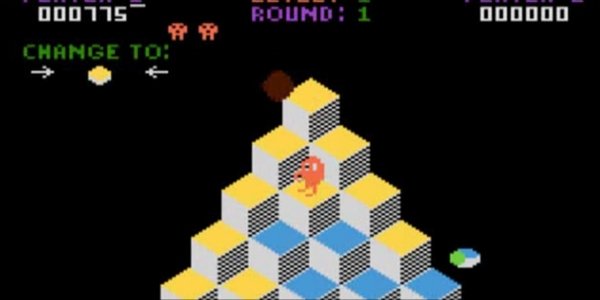An AI Has Discovered A Never Before Found Q-Bert Glitch

Video game glitches are a dime a dozen. They're found everywhere and happen all the time. However, we oftentimes only hear about glitches when players accidentally (or sometimes intentionally) encounter them. But one glitch was only discovered by the pesky deliberations of a computer AI in the Atari game Q*Bert.
Miles Brundage, an AI researcher, provided some of the results of an AI benchmark for playing Atari games, specifically Q*Bert. In a series of tweets posted via his Twitter account, Brundage explained that the AI managed to find a pattern of jumping off the ledge where the enemy NPCs would follow and it would take this risk because it was beneficial to get rid of an enemy to earn enough points to acquire an extra life while the enemy NPC wasn't present.
However, the really fascinating part is that while the AI began hopping back and forth between the platforms after getting rid of the enemy NPC, it found a glitch where it could accrue infinite amounts of points between both platforms. The platforms would begin to blink and a huge amount of points would be awarded to the AI while it was stuck between the two platforms.
Essentially, it sounds like the AI was designed to win by finding ways to complete the game with as many points as possible. The AI found out that gaining points while an enemy NPC was present was disruptive to its goal of getting as many points as possible, so it adapted and found a way to get rid of the enemy NPC.
With the objective to score points to "win" the game, the AI proceeded to find a way to exploit a glitch in Q*Bert in order to score inordinate amounts of points, since that was its objective.
It's a very interesting look into the psychology of AI adaptability.
Players who glitch games usually do so in order to find a way to progress. But an AI with a general parameter of what a "win" condition is seems to want to find ways to "win" and not necessarily progress. It was observed that the AI's intent on getting the highest score as its goal superseded attempts to actually beat the game, since that wasn't the AI's "win" condition.
CINEMABLEND NEWSLETTER
Your Daily Blend of Entertainment News
The original creator of the arcade version of Q*Bert, Warren Davis, chimed in on the Twitter timeline to explain that this was not something present in the version he designed.
The discrepancy obviously comes in from the fact that this is the Atari 2600 version of Q*Bert, and some argue that this may have been an Easter Egg hidden within the game. But how exactly is it triggered? Did the AI know that the Easter Egg was there by observing certain patterns in the routines? Was the enemy baiting part of the Easter Egg? Or was it just a glitch that the AI found a way to exploit in its attempt to get the highest score possible?
It's a fascinating look at how computers function autonomously with a single goal in their design. It could definitely turn very scary if certain AI were given certain parameters and access to an unrestricted network, but for now it's limited to exploiting Atari games in order to become the highest scoring Q*Bert player ever.
Staff Writer at CinemaBlend.
Y2K Checked All The Boxes For This '90s Kid, But I Need To Talk Out One Issue I Had With The A24 Horror-Comedy
Finn Wolfhard Had An 'Emotional Hangover' After His Last Day On Stranger Things, And I'm Having My Own After Seeing His Comments On It
As A Star Wars Horror Project Is Reportedly In The Works, I Have An Idea That Would Make For A Chilling Movie











